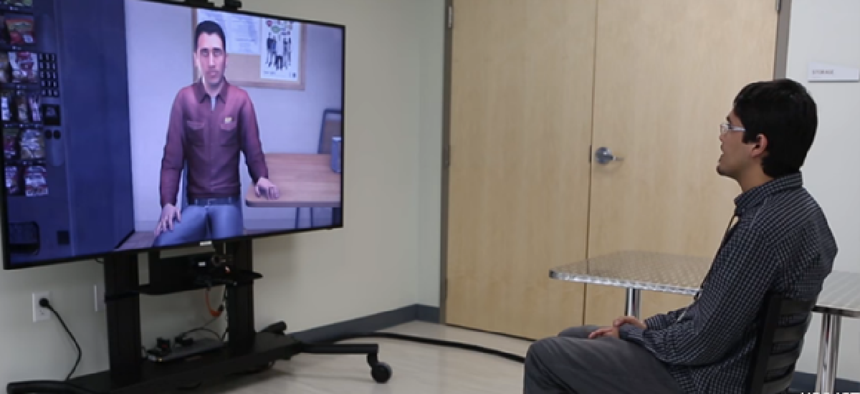Vets prep for careers with virtual job interviews


Connecting state and local government leaders
The Virtual Training Agent for Veterans, or VITA4VETS, helps vets prepare for job interviews by building their professional conversation skills and reducing anxiety.
The Army Research Laboratory has developed a virtual simulation practice system to help veterans build their job interviewing skills and address anxiety.
Working with researchers and developers at the University of Southern California's Institute for Creative Technologies (ICT), Google.org and the Dan Marino Foundation, ARL originally developed the Virtual Training Agent for Veterans, or VITA4VETS, to help those with autism prepare for job interviews, but they soon realized its wider potential.
"Although many veterans have the necessary talent and temperament for vocational achievement, they may find it challenging to express the ways in which their skills and experience are able to translate to the private sector," said Matthew Trimmer, project director for VITA4VETS at ICT.
That's where VITA4VETS comes in. The system uses six characters, or virtual humans, that can be customized to let vets practice the interpersonal skills they'll need for job interviews. Each employer/character is capable of three behavioral dispositions or interview styles (soft-touch, neutral, hostile) and can be placed in a variety of interchangeable background job contexts (office, restaurant, warehouse, etc.), all controllable from an interface menu.
VITA4VETS was built with Unity3D game development platform, and all the objects and environments were created with Maya computer graphics software and use the ICT-developed natural processing software, Trimmer told PCMag. Videos are taken of veterans interacting with the characters for post-session analysis.
To improve the feedback, ICT researchers want to use a more-sophisticated camera that would enable the system to track emotions by gauging vets' eye contact with the interviewer, body language and speech intonations. The researchers also are building a gamification component into the system so users can track their own progress.
VITA4VETS is currently available through U.S. VETS in Los Angeles, a nonprofit provider of services to homeless and at-risk veterans.
VITA4VETS is not the first collaboration between ARL and ICT.
In 2015 the ARL Human Research and Engineering Directorate worked with ICT on Ellie, an avatar designed to interview candidates and identify depression and PTSD. The system can read human emotion by sensing smiles, frowns, gaze shifts and other non-verbal behaviors, as well as analyzing the content of the speech. It can engage in dialogue, deciding when to prompt for more information or give empathic feedback to a user response. A recent study suggests people who spoke to Ellie were willing to reveal more to her than to a real person, Army officials said.
Prior to that, ICT helped the Army develop a laptop-based training app that used virtual humans and story-based scenarios to teach sexual assault counseling techniques to junior leaders.





